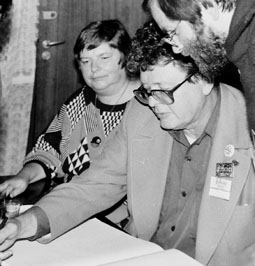„Jeden człowiek nie może zmienić historii.”
Postać: Thornberg
Sam Hall
Poul William Anderson – amerykański pisarz science fiction i fantasy.
Używał pseudonimów A.A. Craig, Michael Karegeorge, Winston P. Sanders.
Jego rodzice pochodzili z Danii, ojciec nosił nazwisko Andersen, ale w czasie służby wojskowej w czasie I wojny światowej zmienił na bardziej anglosaskie „Anderson”. Przez krótki okres swojego życia, po śmierci ojca, Poul mieszkał z matką w Danii. Rodzina wróciła do Stanów po wybuchu II wojny światowej.
Wychował się w Teksasie i Minnesocie. W roku 1948 ukończył fizykę na Uniwersytecie Minnesota. Interesował się również historią, językiem i literaturą rodzinnego kraju rodziców. Wiedzę tę wykorzystał później w swojej książkach. Poruszał się swobodnie zarówno w tak zwanej twardej fantastyce, jak i w fantasy.
Jego córka, Astrid, wyszła za mąż za znanego pisarza s-f Grega Beara.
Debiut literacki Andersona to opowiadanie napisane wspólnie z F.N. Waldropem Tomorrow’s Children w 1947. Był członkiem Fantasy Society w Minneapolis, gdzie początkowo mieszkał. W 1952 roku wydał pierwszą powieść Vault of the Ages. Był redaktorem i wydawcą wielu książek.
Był szóstym przewodniczącym Science Fiction and Fantasy Writers of America, przejmując urząd w 1972.
Zmarł na raka 31 lipca 2001 po miesięcznym pobycie w szpitalu.
Wikipedia

„Jeden człowiek nie może zmienić historii.”
Postać: Thornberg
Sam Hall
Now I killed a man they said
So they said, so they said
Oh I killed a man they said
Yes they said
I killed a man they said
And I left him layin dead
Cause I bashed his bloody head
Blast his eyes. (ang.)
Sam Hall
Źródło: Sam Hall, ludowa piosenka angielska
“Her rank was higher than his, so high that no one in her family worked productively.”
Źródło: The Enemy Stars (1959), Chapter 1 (p. 4)
In the first edition of the book, this quote reads: Better a life like a falling star, brief and bright across the dark, than the long, long waiting of the immortals, loveless and cheerlessly wise.
Źródło: The Broken Sword (1954), Chapter 28 (p. 206)
Death and the Knight (p. 752)
Time Patrol
“Silence fell. The clock on my mantel ticked aloud and the wind outside flowed past like a river.”
Źródło: There Will Be Time (1972), Chapter 16 (p. 175)
“A cultured, sensitive, observant man is a pleasure to be with in any age.”
Źródło: There Will Be Time (1972), Chapter 9 (p. 97)
Źródło: The Boat of a Million Years (1989), Chapter 19 “Thule”, Section 32 (p. 517)
“What’s the point of our living all these centuries if we haven’t grown up even a little?”
Źródło: The Boat of a Million Years (1989), Chapter 19 “Thule”, Section 27 (p. 482)
Źródło: The Boat of a Million Years (1989), Chapter 19 “Thule”, Section 18 (p. 449)
Źródło: The Boat of a Million Years (1989), Chapter 19 “Thule”, Section 14 (p. 441)
Źródło: The Boat of a Million Years (1989), Chapter 18 “Judgment Day”, Section 15 (p. 396)
Źródło: The Boat of a Million Years (1989), Chapter 18 “Judgment Day”, Section 3 (p. 336)
“Well, I’ll try to sketch it out for you, but I’ll have to repeat stuff I’ve told you before.”
“That’s all right. I’m a simon-pure layman. My basic thought habits were formed early in the Iron Age. Where it comes to science, I can use plenty of repetition.”
Źródło: The Boat of a Million Years (1989), Chapter 18 “Judgment Day”, Section 3 (p. 331)
Źródło: The Boat of a Million Years (1989), Chapter 18 “Judgment Day”, Section 3 (p. 330)
“No amount of money would stave off a nuclear warhead.”
Źródło: The Boat of a Million Years (1989), Chapter 18 “Judgment Day”, Section 3 (p. 328)
Źródło: The Boat of a Million Years (1989), Chapter 18 “Judgment Day”, Section 3 (p. 327)
“Well, everybody got stupid now and then, especially in war.”
Źródło: The Boat of a Million Years (1989), Chapter 17 “Steel” (p. 306)
“I seek occasional relief in old books. They help me tell the transient from the enduring.”
Źródło: The Boat of a Million Years (1989), Chapter 16 “Niche” (p. 291)
Źródło: The Boat of a Million Years (1989), Chapter 16 “Niche” (p. 291)
“She seldom bothered taking revenge. Time did that for her, eventually.”
Źródło: The Boat of a Million Years (1989), Chapter 15 “Coming Together”, Section 2 (p. 281)
Źródło: The Boat of a Million Years (1989), Chapter 12 “The Last Medicine” (p. 215)
“Your Eminence is as great a man as I have ever met.”
“Then God have mercy on humankind,” Richelieu replied.
Źródło: The Boat of a Million Years (1989), Chapter 11 “The Kitten and the Cardinal” (p. 207)
Źródło: The Boat of a Million Years (1989), Chapter 11 “The Kitten and the Cardinal” (p. 205)